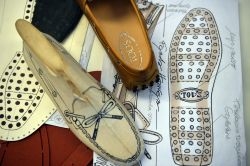Tod’s shoes turns from Italy to beat crisis

Harrison Ford, Princess Caroline of Monaco and Brad Pitt — as well as countless of the newly rich in places like Brazil and China — are among the wealthy foreign clients that are boosting sales.
The craftsmanship and management may still be homegrown but the company — like many in the Italian luxury sector — has been forced to give up on its domestic market, at least for now.
Sales in Italy last year fell by 26.7 percent last year and went up by 55 percent in China.
“Forget” about sales in Italy “for this year and a good few years after that,” the shoe maker’s dapper billionaire owner, Diego Della Valle, told shareholders at the latest annual meeting.
Tod’s managed to ring in a net profit of 145.5 million euros ($188.6 million) last year — a 7.4-percent increase on 2011 — despite the context of austerity and recession at home, where the economy has now been shrinking for two years.
Sales were 963.1 million euros in 2012.
Tod’s is headquartered in a minimalist complex surrounded by olive trees in the Marche region in central Italy.
A father-and-son team, 51-year-old Daniele and 21-year-old Matteo, are among the 900 workers at the plant.
“It’s important to be able to pass on these skills,” Daniele said in one of the workshops, filled with the smell of glue and leather.
The company, which employs a total of 3,000 people worldwide, was founded in 1978 and has become famous for its mocassins with rubber pebble soles.
It produces around 2.5 million pairs a year — retailing from around 300 euros ($397) each.
“It’s like a bank here,” said Toni Ripani, 66, who manages the rich stock of leathers and skins, as he handled two rare blue crocodile skins.
Tod’s shoes are usually made with between 25 and 30 components, but that can range up to 70 for a particularly sophisticated model.
Each new model is tried out by two employees.
One of them, 39-year-old Roberto, said that his working motto is: “Work with passion while paying attention to the details.”
Detail is something of an obsession at Tod’s — which has exactly 133 rubber pebbles on each sole, a signature touch for the group.
The company had an underwhelming start.
Its first collection was a flop but it gained fame after the flamboyant late boss of auto giant Fiat, Gianni Agnelli, wore a pair in a television interview.
Its collections are now shown on Milan’s catwalks.
The headquarters looks more like an art gallery than a factory — 40,000 square metres (430,600 square feet) filled with paintings and designer furniture like a staircase by Israeli Ron Arad.
On a more practical level, it has a gym and a creche.
While its business model may be all about exports, the company is also looking for homegrown talent.
It has a programme offering 30 six-month apprenticeships for unemployed young Italians — a way of ensuring the future of the brand.
glr/dt/arp

